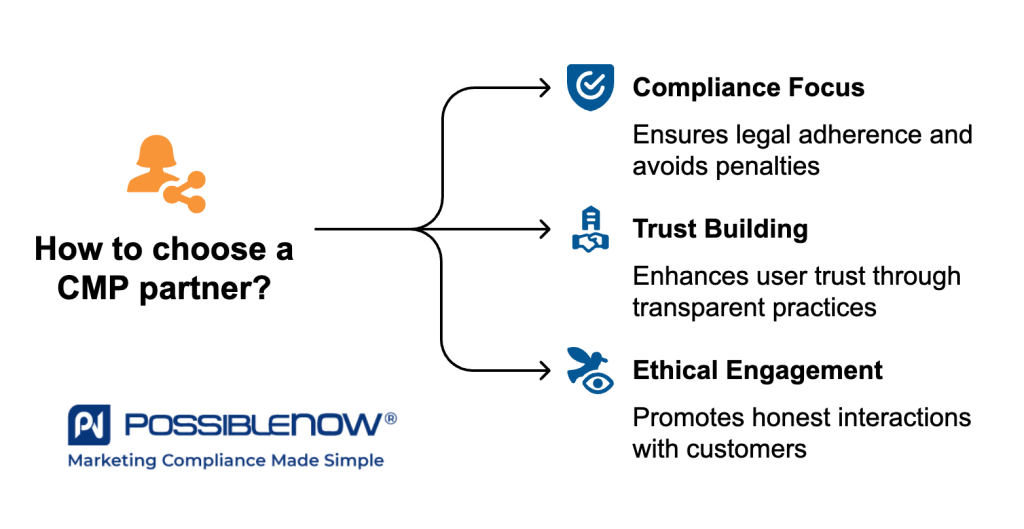Resource Center
How Does a Consent Management Platform Handle User Preferences?
Type: Blog
Topic: Consent Mgmt

A Consent Management Platform (CMP) collects, stores, and manages the consents that users provide regarding how their personal data is processed. This ensures that businesses comply with data privacy regulations while respecting user choices.
Here is a breakdown of the steps a CMP takes to ensure compliance.
Collection of User Consents
CMPs begin by presenting users with clear options regarding how their data can be used. This often involves a consent banner or pop-up that appears when a user visits a website for the first time. Users are given the choice to accept, reject, or customize their data collection preferences. The CMP ensures that this process is transparent and that users are informed about the specific data usage purposes.
Getting Started is Just a Call Away
Storage and Management of Consents
Once user consents are collected, CMPs securely store this information. They use detailed logs to keep track of when and how consent was given, modified, or withdrawn. This record-keeping is crucial for compliance with regulations such as the GDPR and CCPA, which require businesses to demonstrate that they have obtained explicit consent for data processing activities. Individual states sometimes craft their own regulations in addition to federal mandates, making it difficult to keep track of compliance at a state vs federal level.
Updating and Withdrawing Consent
A robust CMP allows users to update or withdraw their consent at any time. This functionality is often accessible through a user account or a dedicated privacy settings page on the website. By providing this flexibility, CMPs empower users to control their personal data according to their preferences of how and when it might be used.
Integration with Business Systems
CMPs integrate with various business systems to ensure that user consents are respected across all data processing activities. This includes syncing consent information with Customer Relationship Management (CRM) systems, marketing platforms, and data analytics tools. By doing so, businesses can ensure that they only use personal data in ways that users have explicitly agreed to.
Benefits for Businesses and Users
For businesses, CMPs offer a streamlined way to manage compliance with complex data privacy laws. They reduce the risk of fines and reputational damage by ensuring that all data processing activities are transparent and consent-based.
For users, CMPs provide confidence that their data preferences are respected and that they have control over their personal information.
Implementing a CMP
Implementing a CMP involves choosing a platform that fits the specific needs of the business and its users. Key considerations include the ability to customize consent requests, robust reporting features, and seamless integration with existing systems.
Companies like PossibleNOW offer comprehensive CMP solutions that can be tailored to meet these requirements.
Choosing a CMP Partner

Consent Management Platforms play a critical role in modern data privacy strategies by managing user consents effectively. They not only help businesses comply with legal requirements but also build trust with users by prioritizing their data privacy preferences.
Explore the Consent Management Platform from PossibleNow to learn more about how we can help you leverage your data, engage ethically and honestly with your customers, and maintain compliance with your communication efforts.
About PossibleNOW
PossibleNOW is the pioneer and leader in customer consent, preference, and regulatory compliance solutions. We leverage our MyPreferences technology, processes, and services to enable relevant, trusted, and compliant customer interactions. Our platform empowers the collection, centralization, and distribution of customer communication consent and preferences across the
enterprise. DNCSolution addresses Do Not Contact regulations such as TCPA, CAN-SPAM and CASL, allowing companies to adhere to DNC requirements, backed by our 100% compliance guarantee.
PossibleNOW’s strategic consultants take a holistic approach, leveraging years of experience when creating strategic roadmaps, planning technology deployments, and designing customer interfaces. PossibleNOW is purpose-built to help large, complex organizations improve customer experiences and loyalty while mitigating compliance risk.
Download Our Consent & Preference Management Buyer’s Kit
-
TCPA Regulations and Compliance: Complete Guide
Type: Blog
Topic: Do Not Call Solution
-
Defining Meaningful Metrics: 6 Soft KPIs to Measure Customer Preference Collection
Type: Blog
Topic: Preference Mgmt
-
Email Preference Center Best Practices
Type: Blog
Topic: Preference Mgmt
-
The Basics of DNC Scrubbing: What Is a Do Not Call (DNC) Scrubber and Why Do You Need It?
Type: Blog
Topic: Do Not Call Solution
-
What is Consent Management, How it Works, & Why it’s Important for Data Compliance
Type: Blog
Topic: Consent Mgmt
-
Do Insurance Companies Cover TCPA Damages?
Type: Blog
Topic: Do Not Call Solution
-
8 Best Practices for Capturing GDPR Consent
Type: Webinars
-
Data Silos Cause Communication Gaps
Type: Videos
Topic: Preference Mgmt
-
Difference Between Preferences & Consent
Type: Videos
Topic: Preference Mgmt
-
Integrate Do Not Call Compliance with Preferences
Type: Videos
Topic: Preference Mgmt
-
Customer Preferences Require More Than One Flavor
Type: Videos
Topic: Preference Mgmt
-
Give Customers Opt-Down Options
Type: Videos
Topic: Preference Mgmt
-
Preference Center Organization
Type: Videos
Topic: Preference Mgmt
-
Strategic Consultants Benefited Scotiabank
Type: Videos
Topic: Industry Testimonials
-
My Call Center is Not in the US. Do I Need to Comply with US Telemarketing Regulations?
Type: Blog
Topic: Do Not Call Solution
-
How Many TCPA Violations Do I Have to Commit to Be Sued?
Type: Blog
Topic: Do Not Call Solution
-
How Does My Business Obtain a SAN Number to Access the DNC Registry?
Type: Blog
Topic: Do Not Call Solution
